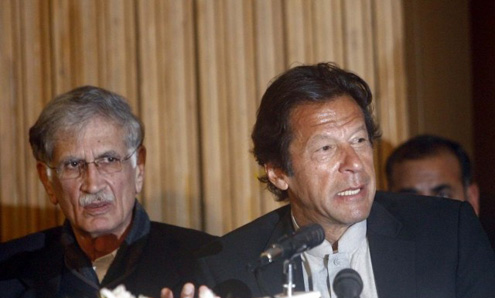 Pakistan’s economic managers, led by Finance Minister Dr Hafeez Sheikh, appear to have returned from Dubai with a strong feeling of satisfaction over the outcome of the talks with the International Monetary Fund. Understandably, the Fund staff have given a patient hearing to Pakistan team’s briefing on the country’s preparations towards FY12 Finance Bill and its ongoing fiscal year’s position.
Pakistan’s economic managers, led by Finance Minister Dr Hafeez Sheikh, appear to have returned from Dubai with a strong feeling of satisfaction over the outcome of the talks with the International Monetary Fund. Understandably, the Fund staff have given a patient hearing to Pakistan team’s briefing on the country’s preparations towards FY12 Finance Bill and its ongoing fiscal year’s position.
The Fund will, therefore, wait until July 31 to ascertain and verify the June 30, 2011 numbers; and also analyse the Parliament-approved Finance Bill for the next financial year. Only then will they submit their report to the Board of Directors on whether Pakistan is well on course under the Stand-By Arrangement (SBA). The Fund must have noted that the government has to retire its debt to the State Bank of Pakistan to be within end September 2010 borrowing limit. And would be appreciative if the government renews its commitment that it would not borrow a single dime from the State Bank of Pakistan in FY12 beyond its limits. The Fund also expects from the government to correct the monetary overhang that resulted from the fiscal slippages that occurred in the middle of fiscal year 2010-11.
The government commitment to fully address the circular debt and tariff differential in power and POL sector by end December 2012 would have been music to the ear of the Fund staff. However, the sticky points that Fund is hesitant to buy is our rhetoric, however dubious, in relation to structural reforms in the revenue collection system. We will be surprised if the Fund permits Pakistan a beyond July deadline to commit itself on the collection of sales tax in the value-added mode as a consumption tax and bring all kinds of income, irrespective of the source, in an equitous system of tax. The Pakistan side while committing to making concerted efforts towards tackling these two politically contentious issues has presented an alternate plan for the transition period. This includes drastic curtailment of the exemptions listed currently under the Sales Tax Act. This does not mean we can continue to insist that Parliament is sovereign and we can only do what is politically feasible. They expect a government to have a majority in Parliament and it is the incumbent’s duty to get the legislative approval for the terms agreed with the Fund for balance of payment support.
The Federal Board of Revenue and the Ministry of Finance have to work within the space provided to them by the political leadership. Both collection of a consumption tax in value-added mode and taxing income irrespective of its source, above the Rs 300,000 threshold require a broad consensus across the political divide. Prime Minister Gilani needs to hold an urgent meeting of the Council of Common Interests (CCI) to address the current macroeconomic imbalances. The four provincial governments need to recognise that the quantum of provincial autonomy, as agreed in the 18th Amendment Package, is a medium to long-term objective.
At present, not only is the revenue collection machinery weak, our taxation system is notoriously unjust. But with all its faults, the Federal Board of Revenue is still able to collect nearly 9 percent of GDP as revenue. On the other hand, the contribution of the four provincial Boards of Revenue (BoRs) is a mere 0.6 percent of GDP. This clearly shows that the provincial BoRs’ performance is at best mediocre, like FBR’s. BoRs, therefore, require capacity-building and upgradation of technical expertise, and also induction of technology. This will take some time. Why shouldn’t the government, as a temporary step, allow FBR to work in tandem with the four BoRs and collect both the consumption and income taxes so that the overall tax-to-GDP ratio improves to 15 percent by 2015-16?
The Prime Minister and the four chief ministers need to be successfully persuaded that our friends abroad are no longer willing to help us with their taxpayers’ money unless we improve our own revenue collection base in an effective meaningful manner. In the Budget FY11, it was envisaged that the inflow of aid and loans would be around $3.6 billion. We would be lucky if we could end the financial year with $1.6 billion under this head. Let us recognise that the world does not owe us a living. The Abbottabad episode has further isolated us; and it’s going to only worsen, among others, our financial woes. Long-term money required for re-building the collapsing infrastructure and for much needed social expenditures on easier terms and below market cost is only made available through international multilateral lending and aid-giving agencies.
The Group of Seven major industrialised countries has greater influence and sway over these agencies because of each member’s voting right on the boards of these institutions. Pakistan decides to annoy them and yet expects financial help from the Fund or the World Bank and its affiliates? The government knows this is not possible. Further, unlike its friends in the Persian Gulf, Pakistan is an energy-deficient country and does not possess the oil or gas exportable surpluses to pay for the imports needed by its people. Emotionalism must not be allowed to take precedence over realism by our political leadership. – brecorder












